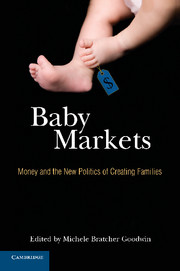Book contents
- Frontmatter
- Contents
- Preface
- Acknowledgments
- Introduction
- PART ONE WHAT MAKES A MARKET? EFFICIENCY, ACCOUNTABILITY, AND RELIABILITY OR GETTING THE BABIES WE WANT
- 1 Baby Markets
- 2 The Upside of Baby Markets
- 3 Price and Pretense in the Baby Market
- 4 Bringing Feminist Fundamentalism to U.S. Baby Markets
- 5 Producing Kinship through the Marketplaces of Transnational Adoption
- PART TWO SPACE AND PLACE: REPRODUCING AND REFRAMING SOCIAL NORMS OF RACE, CLASS, GENDER, AND OTHERNESS
- PART THREE SPECTRUMS AND DISCOURSES: RIGHTS, REGULATIONS, AND CHOICE
- PART FOUR THE ETHICS OF BABY AND EMBRYO MARKETS
- PART FIVE TENUOUS GROUNDS AND BABY TABOOS
- Author Bios
- Index
- References
2 - The Upside of Baby Markets
Published online by Cambridge University Press: 05 August 2012
- Frontmatter
- Contents
- Preface
- Acknowledgments
- Introduction
- PART ONE WHAT MAKES A MARKET? EFFICIENCY, ACCOUNTABILITY, AND RELIABILITY OR GETTING THE BABIES WE WANT
- 1 Baby Markets
- 2 The Upside of Baby Markets
- 3 Price and Pretense in the Baby Market
- 4 Bringing Feminist Fundamentalism to U.S. Baby Markets
- 5 Producing Kinship through the Marketplaces of Transnational Adoption
- PART TWO SPACE AND PLACE: REPRODUCING AND REFRAMING SOCIAL NORMS OF RACE, CLASS, GENDER, AND OTHERNESS
- PART THREE SPECTRUMS AND DISCOURSES: RIGHTS, REGULATIONS, AND CHOICE
- PART FOUR THE ETHICS OF BABY AND EMBRYO MARKETS
- PART FIVE TENUOUS GROUNDS AND BABY TABOOS
- Author Bios
- Index
- References
Summary
Most people object to markets in babies. I disagree, at least in the case of the gamete markets. I take this position because market mechanisms provide unique opportunities for law and culture to recognize that people form families in different ways. If state or federal law, rather than the laws of supply and demand, determines who can have children using reproductive technologies, then many single and gay people likely will be excluded from this important life experience. Moreover, many children will not have the chance to be born at all. Gamete markets allow some minorities – those who, by virtue of their numbers, are unlikely to obtain legal rights and protections through the legislative process – to skirt the majoritarian morality that would otherwise prevent them from forming families.
Majoritarian hostility to families headed by gay and single parents often finds expression in legislative enactments such as the 1996 Welfare Reform, Defense of Marriage Acts, and popular opposition to decisions such as Goodridge v. Dept. of Health, in which the supreme judicial court of Massachusetts overturned the legislative ban on same-sex marriage. Supporters of measures protecting so-called traditional families (and harming so-called nontraditional families) often make moral arguments that heterosexuality and two-parent families are natural, relegating others to the category “unnatural.” Moral or natural are flexible terms that carry multiple meanings such as “inevitable” (“it's only natural”) or “mandated by either biology or God” (i.e., designating nonprocreative acts as “crimes against nature”).
- Type
- Chapter
- Information
- Baby MarketsMoney and the New Politics of Creating Families, pp. 23 - 40Publisher: Cambridge University PressPrint publication year: 2010
References
- 5
- Cited by



